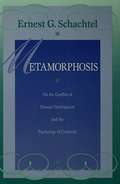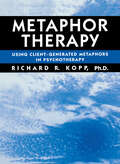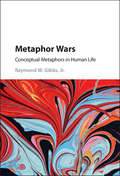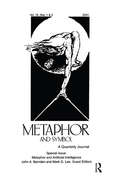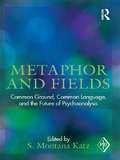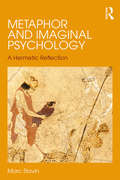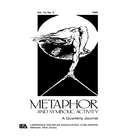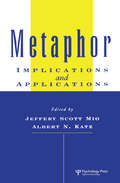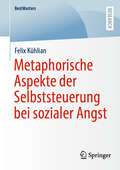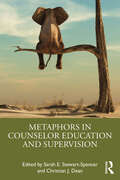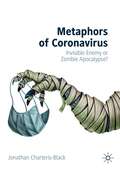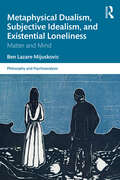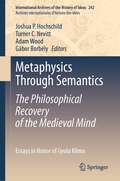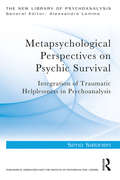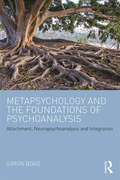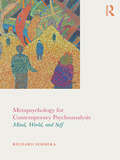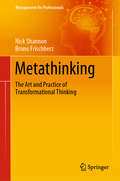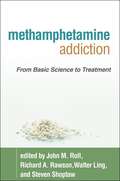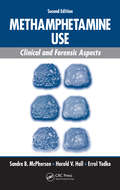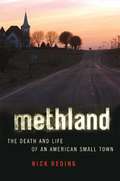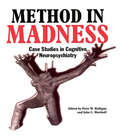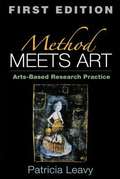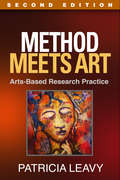- Table View
- List View
Metamorphosis: On the Conflict of Human Development and the Development of Creativity (Psychoanalysis)
by Ernest G. SchachtelFirst published in 1959, Metamorphosis remains one of the great works of developmental psychology of the past century. From his thoughtful meditation on the assumptions of classical Freudian psychoanalysis, among them the pleasure and reality principles, the relations of drive and affect, and the nature and causes of infantile amnesia, Schachtel moves on to profound reflections on the senses considered both in terms of their evolving relation to one another during maturation and as variable ingredients in the perception and cognition of the adult.
Metaphor Therapy: Using Client Generated Metaphors In Psychotherapy
by Richard R. KoppTherapist-generated metaphoric interventions have been used for many years to enhance psychodynamic, Ericksonian, and family systems approaches to therapy.
Metaphor Wars
by Gibbs Raymond W. Jr.The study of metaphor is now firmly established as a central topic within cognitive science and the humanities. We marvel at the creative dexterity of gifted speakers and writers for their special talents in both thinking about certain ideas in new ways, and communicating these thoughts in vivid, poetic forms. Yet metaphors may not only be special communicative devices, but a fundamental part of everyday cognition in the form of 'conceptual metaphors'. An enormous body of empirical evidence from cognitive linguistics and related disciplines has emerged detailing how conceptual metaphors underlie significant aspects of language, thought, cultural and expressive action. Despite its influence and popularity, there have been major criticisms of conceptual metaphor. This book offers an evaluation of the arguments and empirical evidence for and against conceptual metaphors, much of which scholars on both sides of the wars fail to properly acknowledge.
Metaphor and Artificial Intelligence: A Special Double Issue of metaphor and Symbol
by John M. KennedyThis special issue arose out of a symposium on metaphor and artificial intelligence in which the main orientation was computational models and psychological processing models of metaphorical understanding. The papers in this issue discuss: *implemented computational systems for handling different aspects of metaphor understanding; *how metaphor can be accommodated in accepted logical representational frameworks; *psychological processes involved in metaphor understanding; and *the cross-linguistic cognitive reality of conceptual metaphors.
Metaphor and Fields: Common Ground, Common Language, and the Future of Psychoanalysis (Psychoanalytic Inquiry Book Series)
by S. Montana KatzMetaphor and Fields is an explanation and demonstration of the value of metaphoric processes and fields in psychoanalysis. In this book, Montana Katz articulates a future direction for psychoanalysis which is progressively explored, taking into account features essential to psychoanalysts of all persuasions, clinically and theoretically. In this way, psychoanalysis is brought into the postmodern future by fashioning an umbrella for the discipline. With this umbrella, the barriers to mutual understanding may be dismantled and a path permanently forged to the possibility of meaningful international, intercultural, interdisciplinary and poly-perspectival psychoanalytic exchange. Metaphor and Fields organically merges work on metaphoric processes with work on fields. The use of a framework with metaphoric processes and fields combined exhibits the uniqueness of psychoanalysis and shows how it explores and explains human experience. The relational fields of the North American school of relational theory, intersubjective matrices, self object matrices, and the ground breaking work of Madeleine and Willy Baranger are all examples of field concepts that have been successfully employed in theoretical frameworks and clinical technique. They show how other schools of thought can be understood as using an implicit field concept. The chapters in this book approach the subject from diverse vantage points. Taken together, they form an intricate web of psychoanalytic thought that moves the scope of psychoanalysis beyond dispute towards the open, inclusive discussion of core concepts and technique. Metaphor and Fields will be of interest to psychoanalysts, psychiatrists, mental health clinicians, psychologists, social workers, and a wide academic audience drawn from the fields of philosophy, linguistics, comparative literature, anthropology and sociology.
Metaphor and Imaginal Psychology: A Hermetic Reflection
by Marc SlavinMetaphor and Imaginal Psychology: A Hermetic Reflection provides the first full-length exploration of the significance of metaphor in post-Jungian psychology. Its portrayal of the mythological figure of Hermes as a personification of metaphor marks an original contribution to the field of metaphor studies. After a 2,500-year exile from philosophy and related areas of study, beginning with Plato’s ejection of the poets from the ideal city-state, metaphor is today experiencing a season of renewal. Among the fields where its significance as a way of seeing, thinking, and feeling has been especially prominent is archetypal psychology, perhaps the most philosophically attuned of psychological disciplines. Approaching the work of James Hillman and other key archetypal psychologists from a poststructuralist perspective, Metaphor and Imaginal Psychology draws insightful comparisons between archetypal psychology and the deconstructive philosophy of Jacques Derrida, a principle theorist of metaphor’s philosophical resurgence. By linking two disciplines that might at first appear as strange bedfellows, Metaphor and Imaginal Psychology underscores the influence of metaphor in reason and emotion, and makes a compelling case for the Mercurial ethos of our postmodern world. Aside from representing essential reading for therapists and theorists working in post-Jungian studies, the book will appeal to readers, students and scholars of literary criticism, psychology, philosophy and mythology.
Metaphor and Philosophy: A Special Issue of metaphor and Symbolic Activity
by Unknown AuthorDuring the last 15 years, cognitive scientists have discovered things about the nature and importance of metaphor that are startling because of their radical implications for metaphor research and because they require us to rethink some of our most fundamental received notions of meaning, concepts, and reason. Many of the theoretical assumptions that guided earlier generations who worked on metaphor have been undermined by this new research, which has profound implications for philosophy. More specifically, the level of methodological sophistication of empirical studies of metaphor has increased markedly, making possible rigorous, detailed analyses of how metaphors actually structure conceptualization and reasoning. In addition, professionals have learned that metaphor is not merely a linguistic phenomenon but more fundamentally a conceptual and experiential process that structures the world. The articles in this special issue make significant contributions to these advances.
Metaphor: Implications and Applications
by Jeffery Scott Mio Albert N. KatzResearch on metaphor has been dominated by Aristotelian questions of processes in metaphor understanding. Although this area is important, it leaves unasked Platonic questions of how structures of the mind affect such processes. Moreover, there has been relatively little work on how metaphors affect human behavior. Although there are numerous postdictive or speculative accounts of the power of metaphors to affect human behavior in particular areas, such as clinical or political arenas, empirical verification of these accounts has been sparse. To fill this void, the editors have compiled this work dedicated to empirical examination of how metaphors affect human behavior and understanding. The book is divided into four sections: metaphor and pragmatics, clinical uses of metaphor, metaphor and politics, and other applications of metaphor. Chapters contained within these sections attempt to merge Aristotelian questions with Platonic ones.
Metaphorische Aspekte der Selbststeuerung bei sozialer Angst (BestMasters)
by Felix KühlianFelix Kühlian erkundet in diesem Buch die systematische Verwendung von Metaphern in der Interaktion zwischen systemischen Psychotherapeut*innen und Menschen mit der Diagnose soziale Angst. Das Konzept der Selbststeuerung wird aus interdisziplinärer Perspektive betrachtet und auf der Basis der kognitiven Metapherntheorie für eine Systematische Metaphernanalyse aufbereitet. Dabei werden systemtheoretische Grundlagen mit psychologischen Erkenntnissen und therapiepragmatischen Überlegungen zum Selbst und zur Selbststeuerung integriert. So wird ein Weg zu einer Analyse der systematischen Verwendung von Metaphern bereitet, der zugleich für Praktiker*innen und Theoretiker*innen Relevanz hat.
Metaphors in Counselor Education and Supervision
by Sarah E. Stewart-SpencerMetaphors in Counselor Education and Supervision provides counselor educators and supervisors with creative applications of metaphors to help students and supervisees who struggle with abstract clinical concepts or foundational clinical skills. This teaching and supervision guide provides a variety of metaphors to clarify different areas of counselor education and supervision, including but not limited to case conceptualization, self-care, the counseling process, countertransference, suicide assessments, and advocacy. Each metaphor is accompanied by ethical and cultural considerations, group supervision modifications, and alternative uses to help emphasize diversity and ethics. This book will prepare supervisees and students with unique methods for teaching and understanding counseling concepts and skills and supply professional counselors with creative and different perspectives to use in practice.
Metaphors of Coronavirus: Invisible Enemy or Zombie Apocalypse?
by Jonathan Charteris-BlackThis book explores the metaphors used in public and media communication to ask how language shapes our moral reasoning about the global coronavirus crisis. The author offers insights into the metaphors, metonyms, allegories and symbols of the global crisis and examines how they have contributed to policy formation and communication. Combining metaphor theory with moral foundations theory, he places metaphors in their historical contexts, and then critically questions why certain tropes might be used in particular situations to persuade and convince an audience. The book takes an integrated approach, involving ideas from cognitive linguistics, history, social psychology and literature to produce a multi-layered and thematically rich interpretation of the language of the pandemic and its social and political consequences. It will be relevant to readers with a background in these areas, as well as anyone with a general interest in the language used to make sense of this global event.
Metaphysical Dualism, Subjective Idealism, and Existential Loneliness: Matter and Mind (Philosophy and Psychoanalysis)
by Ben Lazare MijuskovicSince the ages of the Old Testament, the Homeric myths, the tragedies of Sophocles and the ensuing theological speculations of the Christian millennium, the theme of loneliness has dominated and haunted the Western world. In this wide-ranging book, philosopher Ben Lazare Mijuskovic returns us to our rich philosophical past on the nature of consciousness, lived experience, and the pining for a meaningful existence that contemporary social science has displaced in its tendency toward material reduction. Engaging key metaphysical discussions on causality, space, time, subjectivity, the mind body problem, personal identity, freedom, religion, and transcendence in ancient, scholastic, modern, and contemporary philosophy, he highlights the phenomenology of loneliness that lies at the very core of being human. In challenging psychoanalytic and neuroscientific paradigms, Mijuskovic argues that isolative existence and self-consciousness is not so much of a problem of unconscious conflict or the need for psychopharmacology as it is the loss of a sense of personal intimacy. The issue of the criteria of "personal identity" in relation to loneliness has long engaged and consumed the interest of theologians, ethicists, philosophers, novelists and psychologists. This book will be of great interest to academics and students of the humanities, and all those with an interest in the philosophy of loneliness.
Metaphysics Through Semantics: Essays in Honor of Gyula Klima (International Archives of the History of Ideas Archives internationales d'histoire des idées #242)
by Joshua P. Hochschild Turner C. Nevitt Adam Wood Gábor Borbély“More than any other living scholar of medieval philosophy, Gyula Klima has influenced the way we read and understand philosophical texts by showing how the questions they ask can be placed in a modern context without loss or distortion. The key to his approach is a respect for medieval authors coupled with a commitment to regarding their texts as a genuine source of insight on questions in metaphysics, theology, psychology, logic, and the philosophy of language—as opposed to assimilating what they say to modern doctrines, or using medieval discussions as a foil for ‘new and improved’ conceptual schemes.” Jack Zupko, University of Alberta“Gyula Klima is widely recognized as one of the world’s leading experts on thirteenth and fourteenth-century Latin philosophy, with his own, distinctive analytic approach, which brings out both the similarities and differences between medieval and contemporary logic and semantics.” John Marenbon, Trinity College, University of Cambridge “Gyula Klima has been a towering figure in the field of medieval philosophy for decades. His influence comprises not only the scholarly results of his work, but also intense and generous mentorship of students and junior colleagues. This volume is a perfect reflection of the esteem that he enjoys around the world, collecting excellent pieces by established as well as up-and-coming scholars of medieval philosophy.” Catarina Dutilh Novaes, Vrije Universiteit Amsterdam“For four decades now, Gyula Klima has been setting the standard among medievalists for philosophical sophistication and historical rigor. This collection of wide-ranging studies from leading scholars in the field offers a worthy tribute to that legacy.” Robert Pasnau, University of Colorado BoulderGyula Klima is Professor of Philosophy at Fordham University, and Senior Research Fellow, Consultant, and the Director of Institute for the History of Ideas of the Hungarian Research Institute in Budapest. In 2022, the President of Hungary awarded him the Knight’s Cross of the Hungarian Order of Merit, “in recognition of his outstanding academic career, significant research work and exemplary leadership.” In this volume, colleagues, collaborators, and students celebrate Klima’s project with new essays on Plotinus, Anselm, Aquinas, Buridan, Ockham and others, exploring specific questions in philosophy of mind, philosophy of language, metaphysics, and logic.No contemporary surpasses Kripke and Klima in semantics and metaphysics, but only Gyula Klima’s thought ranges flawlessly over classical philosophy as well. The volume is a fitting tribute to the master. David Twetten, Marquette University
Metapsychological Perspectives on Psychic Survival: Integration of Traumatic Helplessness in Psychoanalysis (The New Library of Psychoanalysis)
by Simo SalonenMetapsychological Perspectives on Psychic Survival explores the integration of traumatic helplessness in the course of psychoanalytic treatment. Based on the author’s many years of experience of working with psychotic and severely traumatised patients, this book offers guidelines to approach extreme psychic trauma in the therapeutic setting. Simo Salonen links psychic representation of the elementary drive phenomena and metaphorical thinking to primary identification understood as a mode of object finding. The collapse of this connection signifies a radical psychic trauma, the integration of which into the temporal continuity of an individual’s life is an essential task for psychoanalysis. Another key element of this book is Salonen’s notion of the primal representative matrix, referring to a resource of primary narcissism that an individual has been endowed with, carrying vital meanings. Also explored is the crucial work of mourning, as the result of which the impoverished ego may recover its primary narcissistic resources. Using insights from numerous case studies, Salonen offers a new way of understanding severe trauma, which can be used to advance both psychoanalytic theory and clinical practice. Metapsychological Perspectives on Psychic Survival will be of great interest to psychoanalysts and psychoanalytic psychotherapists.
Metapsychology and the Foundations of Psychoanalysis: Attachment, neuropsychoanalysis and integration
by Simon BoagMetapsychology and the Foundations of Psychoanalysis redresses faults in Freud’s original conception to develop a coherent theoretical basis for psychodynamic theory. Simon Boag demonstrates that Freud’s much maligned ‘metapsychology’, once revised, can provide a foundation for evaluating and integrating the plethora of psychodynamic perspectives, by developing a philosophically-informed position that addresses the embodied, interconnected relationship between motivation, cognition and affects. The book centres upon the major concepts in psychoanalysis, including the notion of unconscious mental processes, wish-fulfilment, fantasy, and repression. Both philosophical considerations and empirical evidence are brought to bear upon these topics, and used to extract the valuable insights from major approaches. As a result, Boag’s revised general psychology, which stays true to Freud’s intention, addresses psychoanalytic pluralism and shows it is possible to develop a unified account, integrating the insights from attachment theory and object relational approaches and acknowledging the rightful role for neuropsychoanalysis. Metapsychology and the Foundations of Psychoanalysis will be of interest to psychoanalysts, psychiatrists, philosophers of mind and psychologists, as well as anyone concerned with neuropsychoanalysis or psychoanalysis and attachment theory.
Metapsychology for Contemporary Psychoanalysis: Mind, World, and Self
by Richard SemberaMetapsychology for Contemporary Psychoanalysis is a complete revision of the theoretical underpinnings of psychoanalysis and psychodynamic psychotherapy. It seeks to replace the traditional drive–defence model of Freudian tradition with an information processing model of the mind. This book argues that the central human need is for self-knowledge, and that drives are best understood as means towards this end. Richard Sembera begins with a close reading of Freud’s own metapsychological writings, isolating the many unresolved difficulties and inconsistencies which continue to burden psychoanalytical theory today. By returning to the actual observable clinical phenomena in the analytic situation, it is shown that an alternative interpretation is possible that eliminates the theoretical difficulties in question. In the analytic situation, Sembera argues that clinicians do not in fact see individuals struggling against the expression of biological drives, rather they observe individuals struggling to clarify their experience of themselves in the presence of the analyst and put this experience into words. When this process is formalized and expressed in theoretical terms, it is found to consist of three distinct aspects:?objectification, imagination, and symbolization. This process as a whole—ascent towards the other, relationship with the other, disclosure of self in the light of the other—is termed the dialectical structure of the self. It is conceptualized as the main accomplishment of the core mental process, the process of contextualization. This work is distinguished from other attempts at theoretical revision by its fundamental commitment to coherence and clarity as well as its determination to challenge accepted psychoanalytic dogma. It argues for the complete irrelevance of biology and neuroscience to the psychoanalytic enterprise and rejects the theory of drives in its entirety. Instead it affirms the centrality of the traumatic response to mental functioning, emphasises the social matrix in which drives are embedded, re-examines the concepts of free will, accountability, and responsibility, and concludes with an attempt to understand waking life as a creative product analogous to the lucid dream.? Drawing on major psychoanalytic thinkers including Bollas and Benjamin, and current philosophy of mind, this book provides readers with a clear, updated model of metapsychology. Metapsychology for Contemporary Psychoanalysis will appeal to psychoanalysts and psychotherapists, as well as philosophy scholars and anyone with an interest in the philosophy of psychoanalysis.
Metathinking: The Art and Practice of Transformational Thinking (Management for Professionals)
by Bruno Frischherz Nick ShannonThis book compels professionals to actively imbibe self-awareness in their thought process in order to help them manage complexities in business. The authors explore dialectical thinking –in contrast to logical thinking—and introduce a new mind-opening thinking process called “Metathinking”. Four case studies demonstrate the application of Metathinking. The reader shall come across, and learn from, a multitude of mind opening questions on a variety of topics, with particular focus on leadership and transformation. Practical exercises are also offered for training and discussion in the workplace.
Methamphetamine Addiction
by John Roll Richard RawsonSeparating myth from fact, this authoritative work reviews the breadth of current knowledge about methamphetamine addiction and describes the most promising available treatment approaches. Leading experts present state-of-the-art information on the effects of methamphetamine on the brain, body, mental health, and behavior. Psychosocial and pharmacological treatment strategies are critically evaluated, including approaches to treating dually diagnosed clients. Written in a concise, accessible style, the volume emphasizes that recovery is possible, despite the significant challenges the drug poses. The authors identify key avenues for collaboration among clinical, public health, and other professionals.
Methamphetamine Use: Clinical and Forensic Aspects, Second Edition
by Sandra B. McPherson Harold V. Hall Errol YudkoUpdated and expanded to reflect changes in recent years, this second edition covers virtually every aspect of this dangerous drug, including history, pharmacology, pathology, physiology, treatment, clinical and forensic psychology, and legal aspects. This edition features new chapters on criminal- and civil-forensic applications including an in-depth discussion of recent laws. Pointing out important cases, articles, and statistics, the text also presents chapters on neuropsychological testing; normative data on risk analysis and violence prediction; the physiology of tweaking, the most dangerous stage of the meth cycle; and the efficacy of treatment programs including examples from newly established drug courts.
Methland: The Death and Life of an American Small Town
by Nick RedingThe dramatic story of the methamphetamine epidemic as it sweeps the American heartland; a timely, moving, very human account of one community's attempt to battle its way to a brighter future. Crystal methamphetamine is widely considered to be the most dangerous drug in the world, and nowhere is that more true than in the small towns of the American heartland. Methland tells the story of Oelwein, Iowa (pop. 6,159), which, like thousands of other small towns across the country, has been left in the dust by the consolidation of the agricultural industry, a depressed local economy, and an out-migration of people. As if this weren't enough to deal with, an incredibly cheap, long-lasting, and highly addictive drug has rolled into town. Over a period of four years, journalist Nick Reding brings us into the heart of Oelwein through a cast of intimately drawn characters, including: Clay Hallburg, the town doctor, who fights meth even as he struggles with his own alcoholism; Nathan Lein, the town prosecutor, whose caseload is filled almost exclusively with meth-related crime; and Jeff Rohrick, a meth addict, still trying to kick the habit after twenty years. Tracing the connections between the lives touched by the drug and the global forces that set the stage for the epidemic, Methland offers a vital and unique perspective on a pressing contemporary tragedy.
Method In Madness: Case Studies In Cognitive Neuropsychiatry
by John C. Marshall Peter W. HalliganIn clinical neuropsychiatry, case studies provide invaluable demonstrations of the range and types of unusual psychological states that can occur after brain damage. In the pursuit of objectivity and scientific respectability, however, many academic reports of neuropsychiatric disorders appear cold, contrived and impersonal. The essence and character of the patient's experience and behaviour is easily obscured or even lost - a fact that cannot help researchers, therapists and other practitioners to relate their conceptual knowledge to the flesh-and-blood people they meet in their professional lives. In practice, much of the actual discourse of such patients has been ignored as unworthy of scientific interest. This book describes real patients in a clear and jargon-free way. These cases should serve to reduce the discrepancy between the formal representations of psychiatric illness in the mainstream literature and the reality of people struggling to make sense of their own predicament in everyday life.
Method Meets Art
by Patricia LeavyThis book presents the first comprehensive introduction to arts-based research (ABR) practices, which scholars in multiple disciplines are fruitfully using to reveal information and represent experiences that traditional methods cannot capture. Each of the six major ABR genres--narrative inquiry, poetry, music, performance, dance, and visual art--is covered in chapters that introduce key concepts and tools and present an exemplary research article by a leading ABR practitioner. Patricia Leavy discusses the kinds of research questions these innovative approaches can address and offers practical guidance for applying them in all phases of a research project, from design and data collection to analysis, interpretation, representation, and evaluation. Chapters include checklists to guide methodological decision making, discussion questions, and recommended print and online resources.
Method Meets Art
by Patricia LeavyThis book presents the first comprehensive introduction to arts-based research (ABR) practices, which scholars in multiple disciplines are fruitfully using to reveal information and represent experiences that traditional methods cannot capture. Each of the six major ABR genres--narrative inquiry, poetry, music, performance, dance, and visual art--is covered in chapters that introduce key concepts and tools and present an exemplary research article by a leading ABR practitioner. Patricia Leavy discusses the kinds of research questions these innovative approaches can address and offers practical guidance for applying them in all phases of a research project, from design and data collection to analysis, interpretation, representation, and evaluation. Chapters include checklists to guide methodological decision making, discussion questions, and recommended print and online resources.
Method Meets Art
by Patricia LeavyThis book presents the first comprehensive introduction to arts-based research (ABR) practices, which scholars in multiple disciplines are fruitfully using to reveal information and represent experiences that traditional methods cannot capture. Each of the six major ABR genres--narrative inquiry, poetry, music, performance, dance, and visual art--is covered in chapters that introduce key concepts and tools and present an exemplary research article by a leading ABR practitioner. Patricia Leavy discusses the kinds of research questions these innovative approaches can address and offers practical guidance for applying them in all phases of a research project, from design and data collection to analysis, interpretation, representation, and evaluation. Chapters include checklists to guide methodological decision making, discussion questions, and recommended print and online resources.
Method Meets Art, Second Edition
by Patricia LeavyA comprehensive, highly accessible introduction to arts-based research (ABR), this widely used text provides a practical guide for researchers who want to uncover information that traditional methods cannot capture. Patricia Leavy addresses all eight major ABR genres--narrative inquiry, fiction-based research, poetry, music, dance, theatre, film, and visual art. Following a consistent format, chapters review how each genre developed, explore its methodological variations and the kind of research questions it can address, and describe sample studies. An exemplary research article or online video link demonstrates each set of techniques in practice. New to This Edition: *Covers two additional ABR genres: fiction-based research and film. *Chapter on the criteria for evaluating ABR studies. *Most end-of-chapter exemplars are new; plus links to online exemplars added for ABR performance studies. *Chapters restructured to follow a consistent format. *Implications for creative arts therapies are addressed throughout. *Increased attention to public scholarship and audience issues. *Expanded discussions of ABR as a paradigm, playbuilding, and technology. Pedagogical Features: *Checklists of issues to consider when deciding how to use a particular method. *Discussion questions and activities that can be worked on in class or assigned. *Annotated lists of suggested readings and websites, including links to online performance pieces. *Instructive research examples from multiple disciplines. *Flexibly organized so that chapters can be read independently or in sequence.
